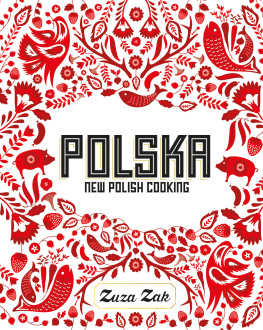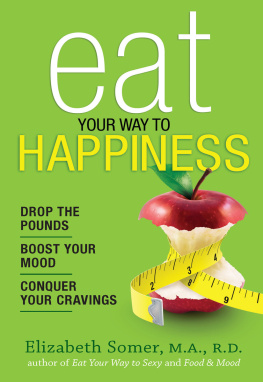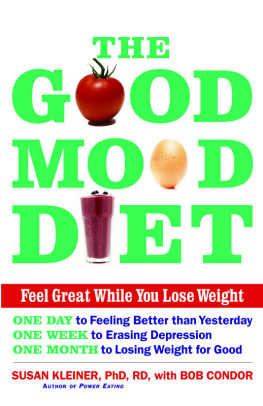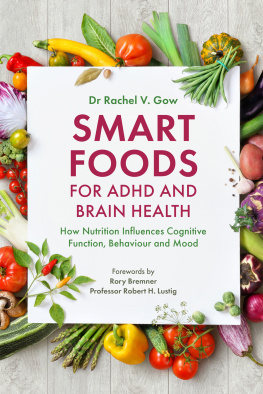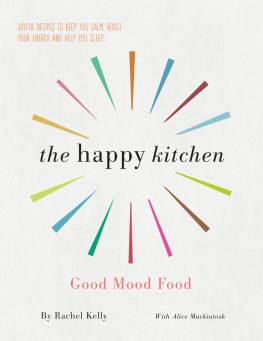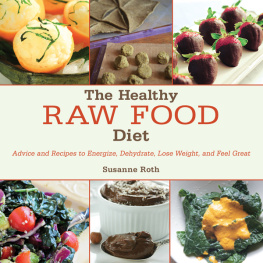Thank you for downloading this Simon & Schuster ebook.
Get a FREE ebook when you join our mailing list. Plus, get updates on new releases, deals, recommended reads, and more from Simon & Schuster. Click below to sign up and see terms and conditions.
CLICK HERE TO SIGN UP
Already a subscriber? Provide your email again so we can register this ebook and send you more of what you like to read. You will continue to receive exclusive offers in your inbox.
We hope you enjoyed reading this Simon & Schuster ebook.
Get a FREE ebook when you join our mailing list. Plus, get updates on new releases, deals, recommended reads, and more from Simon & Schuster. Click below to sign up and see terms and conditions.
CLICK HERE TO SIGN UP
Already a subscriber? Provide your email again so we can register this ebook and send you more of what you like to read. You will continue to receive exclusive offers in your inbox.
For Edward
INTRODUCTION
I used to think of food as being physical fuel, or a way to celebrate special occasions. Now I am learning about the power of food, and its role in boosting our mental health. In recent years it has become widely accepted that we need to look after our mind in the same way that we look after our body. What is exhilarating is that changing what we eat is something we can do for ourselves.
In the field of nutrition, new research and evidence is emerging all the time, and I have done my best to report what experts are discovering. The Happiness Diet also reflects my personal experience and how I have become calmer and more content by changing my diet. It is intended to be a gentle guide. I dont want any rules to weigh you down. Anxiety and depression are individual experiences, and this means that the way we respond to treatment differs too.
Some of what I share in this book reflects basic biology that I wish Id learned at school: for example, how fluctuating blood sugar affects our adrenal glands, which can trigger bouts of anxiety. Other advice addresses the effect of particular foods on our nerves, brain, and digestion, which in turn affect our moods.
There is a degree of truth to Hippocratess claim two millennia ago that all disease begins in the gut. Recently, scientists have advanced our understanding of the gut and its relationship with the rest of our body in fascinating ways. It is responsible for producing a large proportion of our neurotransmitters, the chemicals that communicate information throughout the body and brain. There are eight main neurotransmitters that affect our happiness, including serotonin and dopamine, sleep-inducing melatonin, and oxytocin, which is sometimes referred to as the love hormone. In fact, as much as 90 percent of serotonin is made in our gut, and around 50 percent of dopamine. The enteric nervous system, which is the part of the nervous system embedded in our gut, contains as many neurotransmitters as our brain.
Much of the research on the links between anxiety and the health of our gut bacteria or gut microbiota has been done on mice. Indeed there are quite a few animal studies that find strong links between gut microbiota and anxiety-related behaviors. So cultivating a healthy gut may prove an important way to cheer us up. As well as supporting our immune system, a healthy gut digests vital minerals and nutrients. Without this basic function, you could eat all the Good Mood Food in the world, but still be unable to enjoy its full benefits.
Our poor, tired brain needs nourishing too. I was amazed to learn that the brain uses about one quarter of our daily energy supply, consuming around 300 calories during the day and roughly the same number at night. No other animal has quite such a hungry brain. An ape would have to eat for around 20 hours a day to feed a brain of a relative size.
I have summarized what I have learned about eating for happiness in my ten Golden Rules at the beginning of this book. These rules underpin the following chapters, in which I explain how to become more energized, more contented, less anxious, more clearheaded, more balanced, and a better sleeper by following a happy diet, and I include recipes that put the theory into practice. For me, this has led to a very happy kitchen. I hope it will make your kitchen happy too.
RACHELS STORY
I have always been something of a worrier, and there have been times in the past when my anxiety has tipped me into depression. Trying to combine my working life in the newsroom of a national newspaper with the demands of a young family triggered my first major depressive episode in my thirties, which I wrote about in my memoir Black Rainbow .
My first breakdown was in 1997, the second in 2003. On both occasions, I was treated mainly with drugs and therapy. This book is not intended as a substitute for either medication or other strategies. Antidepressants, for example, can be a crucial recourse for those suffering from mood disorders, as indeed they were for me many years ago when I was depressed. But ideally our use of them should be short-term, as they can have adverse side effects, including, ironically, suicidal feelings and weight gain.
Because I was always hungry when taking antidepressants, I ballooned in size, which didnt help my morale. My tongue also became furred and my lips cracked. Although the side effects did lessen over time and drugs now cause fewer adverse reactions than they used to, I remember feeling desperately passive, like a powerless insect trapped in amber, unable to take any initiative to improve my own physical and mental well-being. At the time, I determined that I would find other ways to stay calm.
Gradually I managed to recover from depression, and have continued to get better over the years. I have been able to stop focusing on the heavy stuff and get on with the inevitable ups and downs of daily life. Using small, sanity-saving tools like those featured in my book Walking on Sunshine: 52 Small Steps to Happiness has enabled me to feel much happier, and to live more consciously.
Walking on Sunshine reflected the fact that I had already become interested in nutrition, and included a few dietary tips. Some of them were thanks to my GP. At a routine checkup to see how I was dealing with my anxiety, she told me that there was compelling evidence about the links between mood and food, before proceeding to write down a list of happy foods that might keep me calm, including green leafy vegetables, dark chocolate, and oily fish.
Walking on Sunshine also has tips on meditation, a commonsense tactic that has helped to defeat my anxiety. Unsurprisingly, I had worked out the importance of regular exercise, something that many doctors agree may be at least as effective as antidepressants in treating some forms of depression. For years, poetry, too, has been a constant and helpful companion, hence the lines of poetry opening each of our chapters. For me the healing power of words complements the healing power of food. I now rely on all these approaches to staying calm and well. And following a happy diet, in particular, has become a powerful new tool in my toolbox.
I wasnt an unhealthy eater. At heart, I was a meat-and-two-veg sort of girl, not unfamiliar with more exotic ingredients like quinoa, though I didnt know how to pronounce it (keen-wa). I wasnt averse to the odd avocado, spinach, and almond milk smoothie, but was an unadventurous cook, with a few tried-and-true recipes under my belt. As my friends know, my favorite dish was fish pie and sometimes, whisper it, it was store-bought and microwavable. If anyone came for supper, it was my default: I knew that it wouldnt go wrong. Other than that, I cooked fairly basically for my family, including our dog, Sammy, who never complains when I fry a spare bit of meat or fish for him.
Next page

